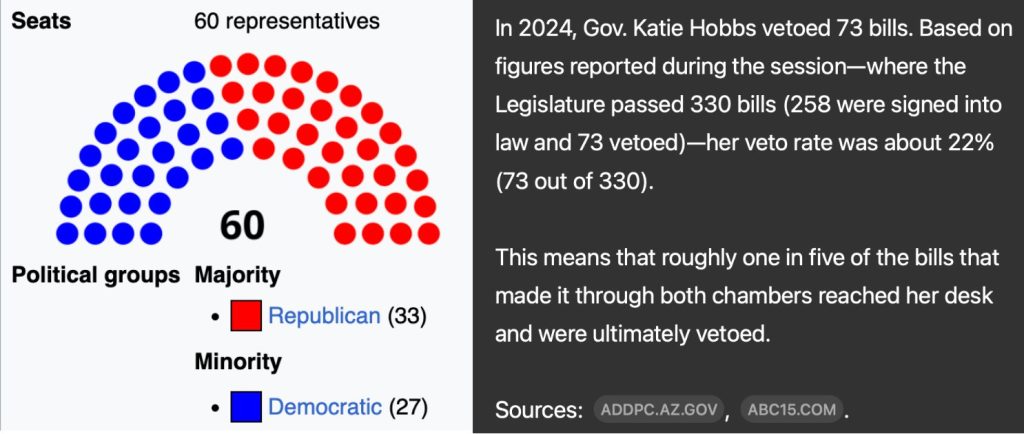Arizona Prepares to Embrace the Future of Bitcoin Mining
In an exciting development for cryptocurrency enthusiasts, the state of Arizona is edging closer to officially adopting the much-anticipated Bitcoin Mining Rights Bill. Passing through the state Senate with a narrow yet decisive vote of 17 to 12 on April 10, the bill, known as HB 2342, now awaits the signature of Governor Katie Hobbs. This significant legislation promises to shape the landscape of cryptocurrency mining across the state, safeguarding the rights of individuals who engage in these activities.
Breaking Down the Bitcoin Mining Rights Bill
Arizona’s HB 2342 is designed to enhance the operational environment for cryptocurrency miners. Specifically, it prohibits local governments—cities, towns, and counties—from imposing bans or undue restrictions on personal use of computational power and the operation of blockchain nodes within private residences. This amendment reflects a growing recognition of cryptocurrency’s importance and potential within Arizona’s economy.
WATCH: Arizona Senate PASSES Bitcoin mining rights bill, by a vote of 17-12 https://t.co/S8YjYoTp3C pic.twitter.com/w8E00DXnkI— Bitcoin Laws (@Bitcoin_Laws) April 10, 2025
The Vision Behind the Legislation
The bill, introduced by state representative Teresa Martinez in January, casts a wide net over activities related to computational power, including not only Bitcoin mining but also artificial intelligence workloads, cloud computing, and scientific research. It aims to foster an environment where innovative technologies can flourish without undue bureaucratic hindrance.
Despite the momentum, it’s worth noting that Governor Hobbs previously rejected legislation that aimed to restrict municipalities from taxing cryptocurrency mining operations. This suggests a complex relationship between state-level advances in cryptocurrency legislation and the governor’s regulatory approach.
Arizona’s Aspirations for Crypto Adoption
Arizona isn’t just stopping with the mining bill. The state is on the cusp of a larger cryptocurrency adoption strategy, aiming to establish a state-level crypto reserve. This movement gained traction with two additional bills that recently cleared the House Rules Committee, paving the way for future full floor votes. Should these bills pass, Arizona could use seized cryptocurrency to invest up to 10% of the state treasury or retirement funds into Bitcoin.
🇺🇸 State Reserve Race Update:Arizona’s House Rules Committee passed both Bitcoin Reserve Bills (SB1373 and SB1025), ruling them “constitutional and in proper form.”The bills have now passed their assigned committees, meaning they should be headed for a full floor vote. pic.twitter.com/suuxXCifP3— Bitcoin Laws (@Bitcoin_Laws) March 24, 2025
This innovative approach could not only stabilize the local economy but also establish Arizona as a hub for cryptocurrency, attracting miners and investors alike. Moreover, the legislation allows for the potential lending of these assets to generate returns, provided financial risks remain manageable.
Challenges Ahead: The Governor’s Veto History
Despite the favorable progress in the legislature, the path isn’t without obstacles. Governor Katie Hobbs has a notable record of vetoing bills—approximately 22% of legislation she has reviewed in 2024 has been rejected. This raises concerns about whether she might choose to veto the Bitcoin Mining Rights Bill or the associated crypto reserve proposals once they reach her desk.

Source: X (Bitcoin Laws)
Why This Matters: The Broader Implications
The passage of the Bitcoin Mining Rights Bill is not just a local issue; it’s a bellwether for the evolving relationship between government policy and cryptocurrency. If successful, Arizona could set a precedent for other states, influencing nationwide attitudes towards mining and blockchain technology. As more regions advocate for supportive legislation, the future of cryptocurrencies looks promising.
Expert Opinions: Perspectives from Analysts
Analysts are keeping a close eye on the developments in Arizona. Some suggest that if the mining rights bill is enacted, it could stimulate local economies by attracting tech investment and fostering a new wave of entrepreneurial activity. Others caution about the need for balancing innovation with regulatory oversight, emphasizing the importance of risk management as the state moves forward.
Looking Ahead: The Future of Crypto in Arizona
The progression of legislation in Arizona could redefine the state’s economic landscape, but its ultimate success hinges on the governor’s decision. If Governor Hobbs signs the bill, Arizona may emerge as a revolutionary epicenter for Bitcoin mining and cryptocurrency investment. Alternatively, a veto could stall progress, potentially leading to frustration within the crypto community.
In conclusion, as Arizona stands on the brink of transformational legislation, the conversation around cryptocurrency rights and regulations is more pertinent than ever. Will Arizona take the leap toward embracing the future of digital currencies, or will regulatory hesitance hold it back? The stakes are high, and only time will tell.
What are your thoughts on Arizona’s Bitcoin Mining Rights Bill? Join the discussion below!

